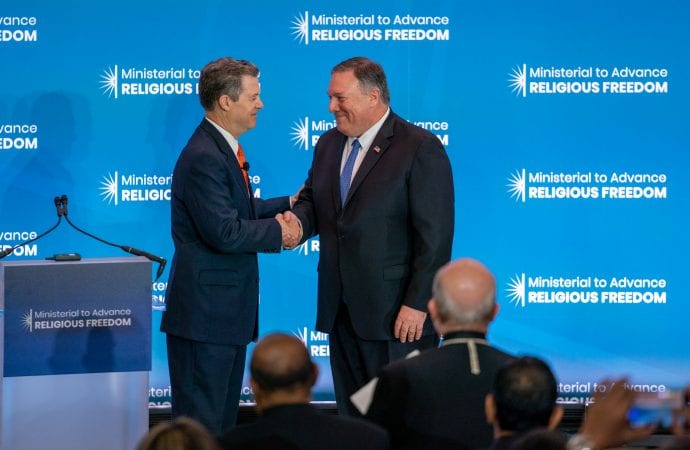Democratic Speaker of the House Nancy Pelosi described repression of religious minorities in China as a “challenge to the conscience of the world” Tuesday during the opening day of a high-level U.S. summit on religious freedom.
Pelosi, a Catholic and the only woman to ever hold the post of House Speaker, said that if the United States is unwilling to call out China for its abuses of religious freedom then it loses its ability to call out other countries for similar abuses.
“Violations are of such scale and so big, and the commercial interests are so significant, that it sometimes tempers our values as to how we are to act on it,” said Pelosi, noting that many countries are unwilling to take a stand on the issue because of the potential profit to be made there.
Pelosi’s remarks came during the Second Annual Ministerial to Advance Religious Freedom sponsored by the U.S. State Department. She was joined by former Republican Congressman Frank Wolf for a discussion moderated by Sam Brownback, ambassador-at-large for international religious freedom.
Wolf, an evangelical Christian who was the architect of the 1998 International Religious Freedom Act which created the post that Brownback now holds, concurred with Pelosi, noting that over the last thirty years there has been a sharp decline in the willingness to call out China for its treatment of people of faith.
In particular, Pelosi singled out Chinese President Xi Jinping as an “authoritarian of the most oppressive nature” and condemned him for his efforts to punish people for their beliefs.
The panel gave special spotlight to the plight of the more than one million estimated Uyghurs, a Muslim minority group that has been confined to concentration camps and is the subject of torture and abuse.
Both Wolf and Pelosi recalled their various visits to China over the last three decades and praised one another for their “courage” in the fight for religious liberty, noting that despite their political differences, they have been able to work across the aisle for common cause.
Wolf also briefly discussed the issue of Christians in China, saying that the “Catholic Church has been coerced,” in an apparent nod to the recent Vatican deal with China allowing for input on the appointment of bishops in the country.
He noted that Cardinal Joseph Zen, the retired archbishop of Hong Kong and fierce critic of the Vatican policy, was recently in Washington and said that the fate of religious people in China is “worse now than any time.”
Brownback did not weigh in on the discussion about the Vatican’s position on China, but in a call with reporters last week he said that he believed it was in everyone’s interests for the specifics of the Vatican-China deal to be made public.
Pelosi did not offer any specific remarks on the deal, but touted her Catholic faith as the thing that compels her to fight for the “dignity and worth of every person.”
“We’re all God’s children, so when I see these abuses of human rights, I think how can a person of faith ever bear that or tolerate that happening?” she said.
The three-day summit is billed as the “largest religious freedom event of its kind in the world,” bringing together more than 1,000 global participants from civil society and faith communities.
Earlier in the day, Secretary of State Mike Pompeo opened the three-day summit by saying that over 100 countries were invited to participate in the gathering and that “despite our many differences, everyone here agrees on the need for religious pluralism.”
“We all agree that fighting so that each person is free to believe, free to assemble, and to teach the tenets of his or her own faith is not optional - indeed, it is a moral imperative that this be permitted,” he continued.
“All people from every place on the globe must be permitted to practice their faith openly - in their homes, in their places of worship, in the public square - and believe what they want to believe.”
On Thursday, Vice President Mike Pence is scheduled to address the ministerial, where he is expected to underscore that religious freedom is a key component to U.S. foreign policy.

